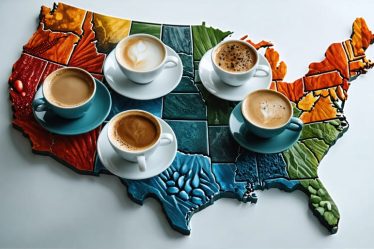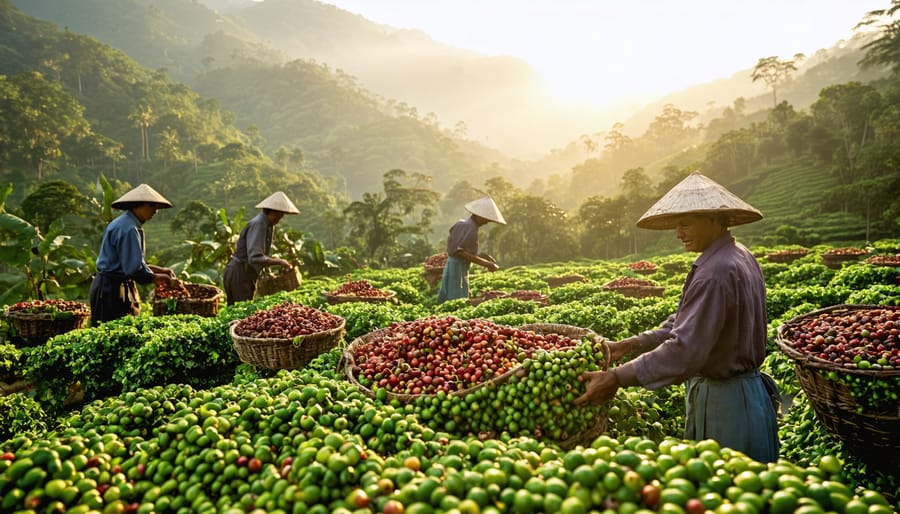
Every sip of coffee connects us to a vast network of farmers, workers, and communities across the globe. Yet behind our morning ritual lies a critical choice: whether our coffee supports ethical practices or perpetuates exploitation. Ethical coffee sourcing isn’t just a buzzword—it’s a commitment to ensuring fair wages, sustainable farming practices, and dignified working conditions for the 25 million smallholder farmers who cultivate our beloved beans.
As a coffee lover who’s visited farms from Guatemala to Ethiopia, I’ve witnessed firsthand how ethical sourcing transforms lives. When we choose fairly traded coffee, we’re not just buying beans—we’re investing in education programs for farmers’ children, supporting women-led cooperatives, and protecting vital ecosystems. Studies show that ethically sourced coffee yields 20-30% higher income for farmers while promoting biodiversity and reducing water consumption.
Today’s conscious consumers face a pivotal moment: our purchasing decisions can either foster positive change or maintain the status quo in an industry historically marked by inequality. Whether you’re a casual sipper or dedicated coffee enthusiast, understanding ethical sourcing empowers you to make choices that align with your values while savoring every thoughtfully sourced cup.
Why Ethical Coffee Sourcing Matters
The Reality Behind Your Morning Cup
Behind every cup of coffee lies a complex web of farmers, workers, and families whose livelihoods depend on those precious beans. While many of us can’t imagine starting our day without coffee, the reality is that many coffee farmers struggle to make ends meet. I recently spoke with Maria, a third-generation coffee farmer from Colombia, who opened my eyes to the daily challenges these communities face.
Traditional coffee farming often involves low wages, unstable market prices, and challenging working conditions. Climate change has made growing conditions increasingly unpredictable, while the rising cost of supplies cuts deeper into already thin profit margins. Understanding these challenges – and how they affect coffee origin and flavor – helps us appreciate why ethical sourcing matters so much.
The good news? More farmers are finding support through fair trade cooperatives and direct trade relationships. These partnerships provide better prices, sustainable farming education, and community development resources. When we choose ethically sourced coffee, we’re not just buying beans – we’re investing in real people and their futures.
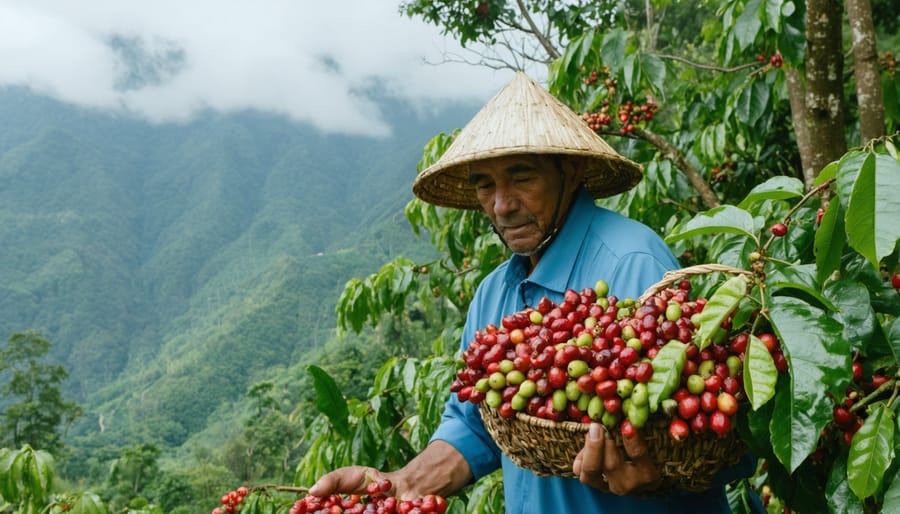
From Bean to Brew: The True Cost
Ever wondered why ethically sourced coffee often comes with a higher price tag? Let me break it down for you, as I discovered during my recent chat with a local coffee roaster. When we pay more for ethically sourced coffee, we’re actually investing in better farming practices, fair wages, and sustainable communities.
A typical cup of mass-produced coffee might cost $2-3, while an ethically sourced alternative might be $4-5. But here’s the eye-opening part: in conventional coffee production, farmers might receive as little as 2% of that final price. With ethical sourcing, that number can jump to 15-20% or more, giving farming families the resources they need to thrive.
Beyond the numbers, ethical sourcing often leads to superior quality beans. When farmers aren’t pressured to cut corners, they can focus on proper harvesting times, careful processing, and sustainable farming methods. The result? You’re not just making a moral choice – you’re treating yourself to a noticeably better cup of coffee. Think of it as a win-win situation: supporting farming communities while elevating your daily coffee ritual.
What Makes Coffee Sourcing Ethical?
Fair Trade vs. Direct Trade
When I first started exploring ethical coffee choices, I found myself puzzled by the terms “Fair Trade” and “Direct Trade” – and I know I’m not alone! Let’s break down these two popular sustainable food sourcing approaches in a way that’ll help you make informed choices at your local coffee shop.
Fair Trade is like having a trusted friend oversee your coffee purchase. This certification ensures farmers receive a minimum price for their beans, plus additional premiums for community development. It’s a structured system with regular audits and clear standards, making it easier for consumers to identify ethical products.
Direct Trade, on the other hand, is more like having a direct line to the farmer. Roasters build personal relationships with coffee producers, often paying higher prices than Fair Trade minimums. They frequently visit the farms, ensuring quality while developing long-term partnerships that benefit both parties.
Both models have their unique advantages. Fair Trade offers widespread impact and consistent standards, while Direct Trade allows for more flexibility and potentially higher earnings for farmers. Many of my favorite coffee shops actually use a combination of both approaches, creating a beautiful blend of ethical sourcing practices.
Remember, whether you choose Fair Trade or Direct Trade coffee, you’re contributing to a more sustainable coffee industry – and that’s something worth celebrating over your morning cup!
Understanding Coffee Certifications
Have you ever noticed those little symbols on your coffee packaging and wondered what they mean? Let me break down these certifications that help us make more ethical coffee choices – I know they were a game-changer in my own coffee-buying journey!
Fair Trade is probably the most recognized certification, ensuring farmers receive fair compensation for their crops and promoting better working conditions. Think of it as a guarantee that your morning brew supports the people who grew those precious beans.
Rainforest Alliance (look for the little green frog!) focuses on environmental sustainability and wildlife protection. These certified farms maintain forest cover and protect local ecosystems while producing your coffee. Bird Friendly certification goes even further, requiring organic certification plus shade-grown coffee that provides essential habitat for migratory birds.
USDA Organic certification means your coffee was grown without synthetic pesticides or fertilizers. While organic doesn’t automatically mean ethical, it often goes hand in hand with more sustainable farming practices.
UTZ (now part of Rainforest Alliance) emphasizes sustainable farming methods and better opportunities for farmers and their families. It’s like a gold star for farms that prioritize both people and planet.
Remember, these certifications aren’t perfect, but they’re valuable tools for making more conscious coffee choices. When I’m shopping, I look for at least one of these certifications as a starting point for ensuring my coffee habit supports positive change in the world.
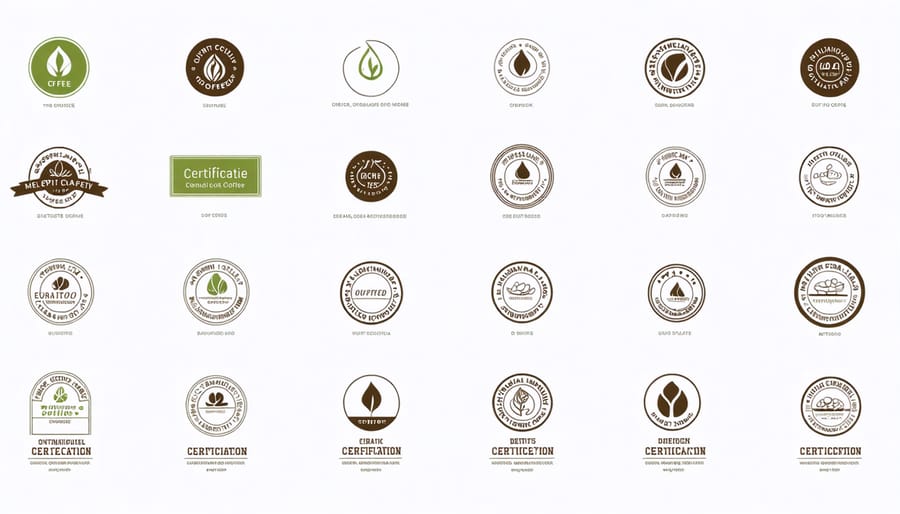
Making Ethical Coffee Choices at Home
Reading Coffee Labels Like a Pro
Ever stood in the coffee aisle feeling overwhelmed by all those buzzwords and badges on coffee bags? You’re not alone! As someone who once grabbed whatever package looked prettiest, I’ve learned that understanding coffee labels is your secret weapon for making ethical choices.
Let’s decode those mysterious symbols together! Fair Trade certification is your first clue to ethical sourcing – it ensures farmers receive fair compensation for their hard work. The Rainforest Alliance’s little green frog tells you the coffee was grown with environmental sustainability in mind. And if you spot the USDA Organic seal, you’re looking at beans grown without synthetic pesticides.
But wait, there’s more! “Direct Trade” means the roaster works directly with farmers, often paying premium prices. “Shade Grown” indicates the coffee was cultivated under a forest canopy, protecting biodiversity. When you see “Single Origin,” you’re getting beans from one specific region, making it easier to trace their journey from farm to cup.
Remember, these certifications are just part of brewing better coffee. Look for roast dates (fresher is better!) and processing methods. Some brands even include QR codes linking to detailed information about their sourcing practices.
Don’t feel pressured to memorize everything at once. Start with one or two certifications that align with your values, and gradually expand your knowledge. Before you know it, you’ll be reading coffee labels like a pro!
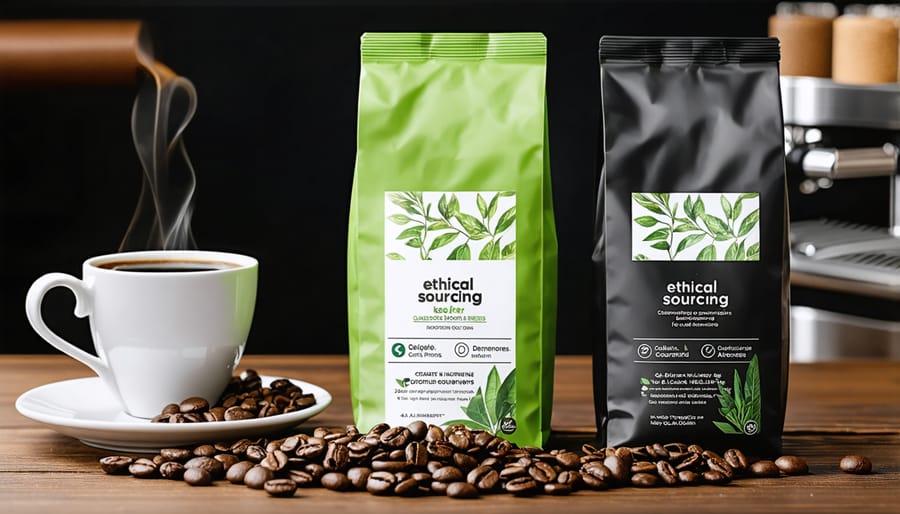
Where to Find Ethically Sourced Coffee
Finding ethically sourced coffee has never been easier, thanks to the growing awareness around sustainable coffee production. I absolutely love exploring local coffee shops that prioritize ethical sourcing – it’s like going on a mini adventure while making a positive impact!
For local options, start with specialty coffee shops in your area. These boutique establishments often have direct relationships with coffee farmers and can tell you exactly where their beans come from. Many also offer educational tastings where you can learn about their sourcing practices while sampling different varieties. Don’t forget to ask about storing coffee beans properly to maintain their fresh, ethically-sourced goodness!
Online shopping opens up a world of ethical coffee options. Look for roasters who proudly display their Fair Trade, Rainforest Alliance, or Direct Trade certifications. Some of my favorite online retailers include:
– Trade Coffee: They partner with small-batch roasters committed to ethical sourcing
– Equal Exchange: A worker-owned cooperative focusing on fair trade relationships
– Bird Rock Coffee Roasters: Known for their direct trade practices and transparency
Farmers’ markets are another fantastic place to discover local roasters who prioritize ethical sourcing. You’ll often get to meet the roasters themselves and hear their passionate stories about working directly with coffee farmers.
Remember, many ethically sourced coffees also come in eco-friendly packaging, so look for compostable bags or options that offer refill programs at their physical locations.
Budgeting for Better Coffee
Like many of you, I used to think ethical coffee meant breaking the bank. But here’s the good news: supporting sustainable coffee practices doesn’t have to drain your wallet! With some smart shopping strategies, you can enjoy both responsible sourcing and reasonable prices.
Start by reallocating your coffee budget rather than increasing it. Instead of buying multiple cheaper bags, invest in one high-quality, ethically sourced option. Consider brewing at home more often – those daily café visits add up quickly, and the savings can go toward better beans.
Look for seasonal deals from reputable roasters who work directly with farmers. Many offer subscription services that can reduce costs by 10-20% while ensuring a steady supply of ethically sourced coffee. Some even provide free shipping on recurring orders.
Remember that price often reflects quality and sustainability. While a $5 bag of coffee might seem tempting, that low price usually means corners are being cut somewhere along the supply chain. Aim for the middle ground – coffees in the $14-20 per pound range often represent the sweet spot between quality, ethics, and affordability.
Shop local when possible. Many small roasters offer loyalty programs or bulk purchase discounts. Plus, building a relationship with your local roaster can lead to insider deals and early access to special releases. They’re usually happy to guide you toward options that match both your taste preferences and budget.
As we wrap up our journey through ethical coffee sourcing, I hope you’re feeling inspired and empowered to make more conscious choices in your daily coffee ritual. I remember when I first started learning about coffee sourcing – it felt overwhelming at first, but small steps led to meaningful changes in how I view and purchase my morning brew.
Remember that every cup of coffee tells a story – one that involves farmers, communities, and ecosystems across the globe. By choosing ethically sourced coffee, you’re not just treating yourself to a superior product; you’re voting with your dollars for a more sustainable and equitable coffee industry.
The key takeaways are simple yet powerful: look for third-party certifications like Fair Trade and Rainforest Alliance, build relationships with local roasters who prioritize transparency, and don’t be afraid to ask questions about where your coffee comes from. These small actions can have ripple effects throughout the entire coffee supply chain.
Starting your ethical coffee journey doesn’t mean you need to transform your habits overnight. Perhaps begin by switching one of your regular coffee purchases to an ethically sourced option, or spend a weekend exploring local roasters who prioritize direct trade relationships. The goal isn’t perfection – it’s progress.
I’ve found that being part of this movement has made my daily coffee routine more meaningful and enjoyable. There’s something special about sipping your morning coffee knowing it was sourced with care and respect for both people and planet.
Let’s make our next cup count. Whether you’re brewing at home or visiting your favorite café, take a moment to consider the journey your coffee has taken. Together, we can foster a more sustainable coffee culture that benefits everyone from bean to cup. Your choices matter, and they’re helping to shape the future of coffee one delicious sip at a time.

